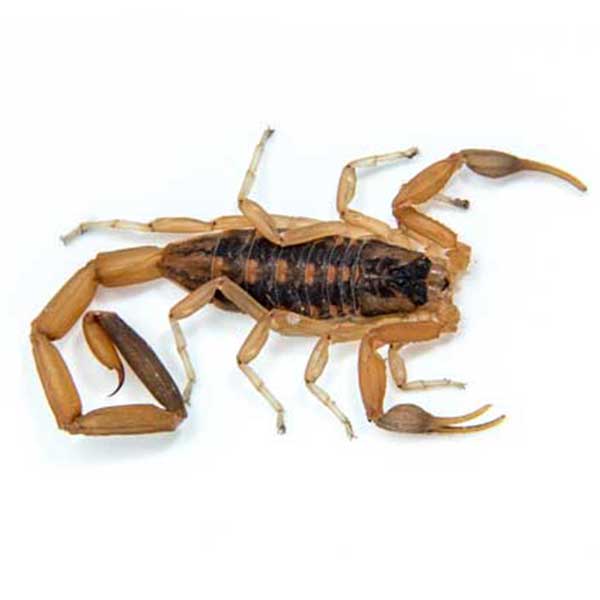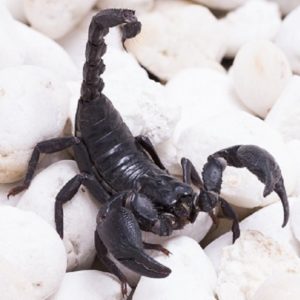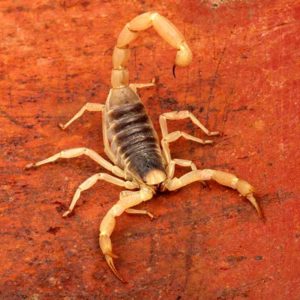As the only species of scorpion in Nevada that can climb, the invasive bark scorpion packs a wallop when it wants to, which is generally in places where humans dare to tread. The Las Vegas area provides this crawling nocturnal nightmare a perfect place to hide and hunt. During the day, they spend most of the time tucked away inside a wide variety of hideaways due to their ability to both climb walls and creep along the floor. In the wild, bark scorpions make their home under rocks, in rock crevices, in trees or on rock walls. Inside a human dwelling, they love dark closets and cool moist areas and are commonly found trapped in sinks or bathtubs when not climbing walls.
Bark Scorpion
Color: Tan to Tan-Yellow
Legs: 8
Shape: Segmented
Size: 2-3″
Antennae: No
Flight: No
Bark Scorpion Habits
In the rare cool seasons of southern Nevada, bark scorpions will hibernate, often congregating in large groups. Baby scorpions live on their mom’s back for up to 21 days and adults routinely live up to 6-years older and longer in the wild. Summer is birth time for these 8-legged pests and due to the harsh environments in which they live and reproduce, bark scorpions have developed the ability to lower their metabolism. This attribute enables them to conserve their oxygen use and survive on a single food source—usually another insect—for up to 4–5 months. Despite this evolutionary convenience for reduced energy consumption, bark scorpions can spring into action rapidly whenever opportunities present themselves.
Threats Posed by Bark Scorpions
Bark scorpions are predators and will attack and feed on a wide array of insects, including spiders, centipedes, other scorpions, and anything else it can catch, which, unfortunately for people, can usually be found in and around human dwellings. Bark scorpions can detect movement for up to 3 feet away well before seeing it. They rarely show themselves in the daytime, instead preferring the cover of darkness to quietly explore their surroundings and infiltrate the usual places: laundry rooms, bathrooms, kitchens, and bedroom closets. Bark scorpions typically give birth to as many as 30 individuals that, while small, are highly venomous.
Bark Scorpion Prevention
Bark scorpions are exceptionally adaptable, permitting them to establish their presence in almost any internal or external habitat conducive to feeding and breeding. They have a preference and need to settle near water and in moisture-laden areas, as it provides them with a steady source of food. Because of their heightened presence in Las Vegas, numerous prevention practices have been developed to avoid contact with this aggressive and dangerous invader.
Bark Scorpion Control
The versatility bark scorpions exhibit in locating food sources and hiding out is truly remarkable. Their ability to feed on almost anything their size and smaller make their immediate world one huge dinner plate. The best approach to eliminating bark scorpions and preventing future problems with them is through professional help. At Rentokil, our pest control professionals resolve bark scorpion infestations using a variety of different treatment techniques.



